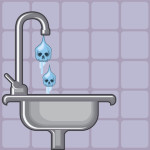All about Water: Part 1:
 There seems to be boundless, popular advice when it comes to our water consumption, how much to drink, what kind of water, how often, when to drink it. It can get downright confusing and there is a lot misinformation floating around. In this article and the following Part 2, you will learn everything you need to know about this topic.
There seems to be boundless, popular advice when it comes to our water consumption, how much to drink, what kind of water, how often, when to drink it. It can get downright confusing and there is a lot misinformation floating around. In this article and the following Part 2, you will learn everything you need to know about this topic.
Our bodies are comprised of 70% water (almost everyone knows this fact), so we know it is crucial to stay hydrated. Yet it is estimated that about 75% of Americans walk around in a state of CHRONIC dehydration. One of the reason for this is that many people assume that when they drink other liquids, such as ice or hot tea, soda, milk, coffee, etc., they are hydrating themselves, when actually these liquids have the opposite effect on the body. There are numerous health conditions that are a direct result from dehydration. These include kidney-, and gallstones, as well as heartburn and indigestion. There are also numerous health conditions where dehydration is an underlying cause which is much less obvious. For example, urinary tract infections (if the body was properly hydrated, bacteria would be flushed out of the system and could not replicate enough to cause this condition), allergies (adequate hydration flushes out the symptom causing histamines), and blood sugar imbalances (sugar becomes more concentrated in our blood with dehydration, causing our blood sugar to become imbalanced, important also for diabetics). Water is also absolutely crucial to our lymphatic system, which removes toxic waste products from our bodies, specifically those that are excreted from our liver and kidneys.
So, let’s recap: Staying optimally hydrated is crucial for overall health and function of our bodies. Drinking anything other than water dehydrates us. Nothing can replace water and we need to make sure we drink enough of it for our body’s needs.
 One of the most confusion causing question is what kind of water we should be drinking. We can simply drink from the tap, hey, why not, it’s free, right?! Well, this is not a good solution. Our tap water contains many things we should not consume, these include chlorine, fluoride (more on these in a separate article), residues from medications, such anti-biotics, anti-depressants, etc., the list is long. This stems from the fact that wastewater plants do not remove these residues when they recycle the water. So tap water should not be consumed as your main source of water. So what is the solution? Specialty water comes to the rescue! There is a lot money being made by producers of water, claiming their specially treated water is the best, most healthy, etc. Choices on the market include reverse osmosis water, distilled water, spring water, filtered water. So which water is best?
One of the most confusion causing question is what kind of water we should be drinking. We can simply drink from the tap, hey, why not, it’s free, right?! Well, this is not a good solution. Our tap water contains many things we should not consume, these include chlorine, fluoride (more on these in a separate article), residues from medications, such anti-biotics, anti-depressants, etc., the list is long. This stems from the fact that wastewater plants do not remove these residues when they recycle the water. So tap water should not be consumed as your main source of water. So what is the solution? Specialty water comes to the rescue! There is a lot money being made by producers of water, claiming their specially treated water is the best, most healthy, etc. Choices on the market include reverse osmosis water, distilled water, spring water, filtered water. So which water is best?
We will discuss this in Part 2 of our water series. Next week we will learn what type of water to drink, how much and also when to consume it for optimal absorption.
Kirstin Leal


